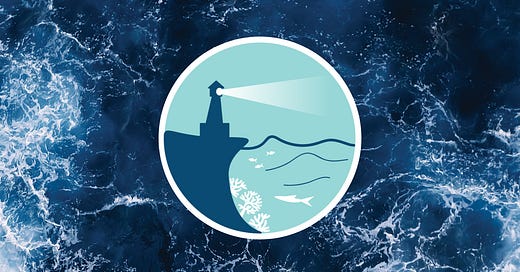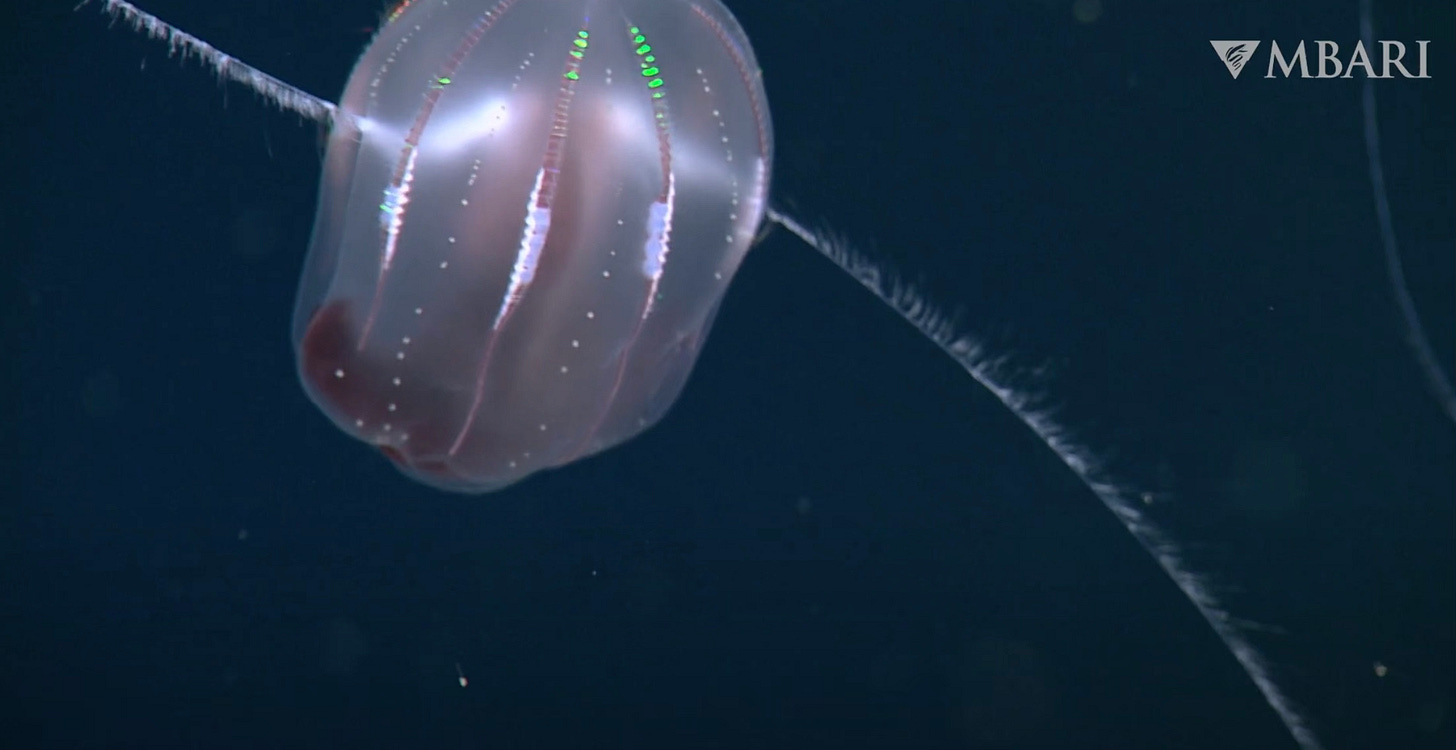Exciting news! In furtherance of our mission to pave the way for ocean and coastal change-makers, our team made the decision to make Ocean Policy Insights free to all. Help us spread the word! Let your friends and colleagues know they can sign up at oceanpolicy.substack.com.
News Highlights
President Donald Trump, sworn in as the 47th President of the United States, began his term by issuing sweeping executive orders—including rolling back climate policies, freezing regulations, revoking DEI programs, withdrawing from international agreements, and establishing the Department of Government Efficiency—while announcing key federal appointees and nominees.
Former President Biden and NOAA announced the designation of the marine portions of Papahānaumokuākea Marine National Monument, a 582,570 square-mile area in the Pacific Ocean, as America’s 18th national marine sanctuary.
NOAA announced its withdrawal of proposed speed limits for vessels smaller than 65 feet in waters used by North Atlantic right whales.
Written by Emily
In yesterday’s 60th U.S. inaugural ceremony, President Donald Trump was sworn in as the 47th President of the United States. He concluded his third and final speech of the day by signing a number of executive orders in front of a crowd at the Capital One Arena, and he later signed more in the Oval Office. Like the beginning of most presidential terms, expect the news to come fast and furious as Trump works toward major accomplishments in his first 100 days.
ICYMI—because it was a lot—here are some policy and personnel announcement highlights from Trump’s first hours in office.
New Executive Policies of Relevance to Ocean and Coastal Communities
Trump:
Revoked 78 of former President Joe Biden Executive Orders, including orders focused on DEIJA, climate, the President’s Council of Advisors on Science and Technology, bans on offshore oil and gas development in certain areas, and implementation of the Infrastructure Investments and Jobs Act (also known as the BIL) and the Inflation Reduction Act
Formally established the Department of Government Efficiency (DOGE) within the Executive Office of the President. DOGE is housed under the United States Digital Service and will exist only until July 4, 2026
Ordered the termination of all DEI programs throughout the government within 60 days and for agency heads to provide the Director of OMB with lists of employees, contractors, or grantees who conducted DEI work, including “federal grantees who received federal funding to provide or advance DEI, DEIA,” or “environmental justice programs, services, or activities since January 20, 2021”
Tasked NOAA, the Secretary of Interior, and the Army Corps to remove regulations and barriers to resource extraction in Alaska, including those relevant to fossil fuels, fishing and hunting, and forestry
Declared an energy emergency to speed up domestic fossil fuel production and signed an order that encourages offshore oil and gas exploration and production
Established a temporary ban on offshore wind leasing in all federal waters, with exceptions for existing leases (he also spent a good deal of time discussing this in his speech)
Withdrew from the Paris Climate Agreement and the World Health Organization.
Established regulatory, hiring, and foreign aid freezes for the federal government for the next 90 days
Ended remote work for federal employees, as feasible, and ordered the creation of a new Federal Hiring Plan that moves away from DEI initiatives
Revived his 2020 order that would make it easier to dismiss some federal employees (this has already attracted a lawsuit and will go to court)
Tasked the Secretaries of Commerce and the Interior to make recommendations on policy changes to prioritize human use of freshwater over endangered or protected species, including fish
Tasked the government with reviewing and assessing existing trade policies and agreements
More Nominations and Appointees
Trump also announced a series of new nominees and appointees to the federal government, including:
Chairmen and Acting Chairmen, including Mark Christie for the Federal Energy Regulatory Commission, Patrick Fuchs for the Surface Transportation Board, and Louis Sola for the Federal Maritime Commission
Cabinet and cabinet-level appointments (all already announced but now formalized)
Acting cabinet and cabinet-level positions, including Jeremy Pelter as Acting Secretary of Commerce, Ingrid Kolb as Acting Secretary of Energy, Benjamine Huffman as Acting Secretary of Homeland Security, Walter Cruickshank as Acting Secretary of Interior, and James Payne as Acting EPA Administrator (these individuals will run their departments or agencies until Trump’s nominees are confirmed by the Senate)
Sub-cabinet appointments, including James Bishop as Deputy Director of OMB, Troy Edgar as Deputy Secretary of Homeland Security, Dario Gil as Undersecretary for Science at the Department of Energy, Jacob Helberg as Under Secretary of State for Economic Growth, Energy, and the Environment, Jared Isaacman as NASA Administrator, Scott Kupor as Director of the Office of Personnel Management, and John Phelan as Secretary of the Navy
Important Dates and Deadlines
Friday, March 14: FY25 government funding deadline
Tuesday, September 30: FY26 government funding deadline
Make sure you have the ESP Advisors printable 2025 Congressional Schedule and our public 2025 Congressional Google calendar at your fingertips!
January 22, 2025
10:00 AM — Hearing to consider the nomination of the Honorable Russell T. Vought, of Virginia, to be Director of the Office of Management and Budget; Senate Committee on the Budget
10:00 AM — Business meeting to vote on the nomination of Sean Duffy, of Wisconsin, to be Secretary of Transportation; Senate Committee on Commerce, Science, and Transportation
January 23, 2025
9:15 AM — Business meeting to vote on the nomination of Lee Zeldin, of New York, to be Administrator of the Environmental Protection Agency; Senate Committee on Environment and Public Works
9:30 AM — Business meeting to vote on the nominations of Douglas Burgum, of North Dakota, to be Secretary of the Interior, and Christopher Wright, of Colorado, to be Secretary of Energy; Senate Committee on Energy and Natural Resources
10:00 AM — Legislative Hearing on H.R.231, HR.261, H.R.331, and the WaterSMART Access for Tribes Act; House Natural Resources Subcommittee on Water, Wildlife, and Fisheries
Introductions
Rep. Bill Keating (D-MA-09) introduced the Sea Turtle Rescue Assistance Act of 2025 (H.R.347). The bill would establish a new grant program at the Department of Commerce to fund rescue, recovery, and research of sea turtles in the U.S.
Reps. Alexandria Ocasio-Cortez (D-NY-14) and Jen Kiggans (R-VA-02) introduced H.R.360, which would direct the Secretary of Commerce to establish an oyster reef restoration and conservation program.
Sens. Dan Sullivan (R-AK) and Tammy Baldwin (D-WI), along with 5 bipartisan cosponsors, introduced the Harmful Algal Blooms and Hypoxia Research Control Amendments Act (HABHRCA) (S.93). This bill would reauthorize the HABHRCA of 1998 and improve monitoring, forecasting, prevention, and mitigation of harmful algal blooms (HABs) and hypoxia by requiring better coordination among task force agencies, and state and local entities, including Indian tribes.
Reps. John Rutherford (R-FL-05) and Darren Soto (D-FL-09), along with 14 Republican original cosponsors, introduced the Red Snapper Act (H.R.470), which would prevent NOAA from enacting any area closures to fishing in the South Atlantic until the Great Red Snapper Count is complete. Sen. Rick Scott (R-FL) also introduced the Senate version of the bill (S.111).
Del. Aumua Amata Coleman Radewagen (R-AS-At Large) and Rep. Ed Case (D-HI-01) introduced the South Pacific Tuna Treaty Act of 2025 (H.R.531), which would revise federal requirements for U.S. commercial fishing vessels operating in the South Pacific.
Rep. Rob Wittman (R-VA-01) and 41 Republican cosponsors introduced the Protecting Access for Hunters and Anglers Act (H.R.556) which would prohibit the ban of lead ammunition use on certain federal lands and waters.
Sen. Bill Cassidy (R-LA) and 4 Republican cosponsors introduced the Offshore Energy Security Act of 2025 (S.109) which would require DOI to hold two offshore oil and gas lease sales per year for 10 years.
Rep. Clay Higgins (R-LA-03) introduced the Laws Ensuring Safe Shrimp (LESS) Act (H.R.512) which would establish a fund to support FDA inspections of antibiotics in shrimp and shrimp products.
Reps. Clay Higgins (R-LA-03), Wesley Hunt (R-TX-38), and Randy Weber (R-TX-14) introduced the Offshore Lands Authorities Act (H.R.513) which would overturn President Biden’s recent offshore drilling ban and create a new process for withdrawals for future leases. Rep. Jodey Arrington (R-TX-19) and Sen. Ted Cruz (R-TX) jointly introduced similar bills (H.R.408, S.104).
Updates
The Supporting the Health of Aquatic Systems through Research, Knowledge, and Enhanced Dialogue (SHARKED) Act (H.R.207) will be voted on by the full House this week. The bill would direct the Secretary of Commerce to establish a task force regarding shark depredation. If the bill passes the House, it would still need to pass the Senate to become law.
The MapWATERS Act (H.R.187) will be voted on by the full House this week. The bill would direct the Forest Service and the Department of the Interior to standardize and publish data relating to public outdoor recreational use of federal waterways.
People
Democratic rosters were released for the House Committee on Science, Space, and Technology; the House Agriculture Committee; the House Committee on Transportation and Infrastructure, and the House Appropriations Committee.
Rep. David Rouzer (R-NC-07) will serve as Vice Chair on the House Agriculture Committee (view subcommittee leadership using the same link).
Rep. Virginia Foxx (R-NC-05) will Chair the House Rules Committee.
Transportation and Infrastructure Committee Chair Sam Graves (R-MO-06) released an updated list of subcommittee Chairs.
House Committee on Energy and Commerce Ranking Member Frank Pallone, Jr. (D-NJ-06) announced Democratic subcommittee membership.
House Committee on Energy and Commerce Chair Brett Guthrie (R-KY-02) announced Republican subcommittee membership.
House Appropriations Committee Chair Tom Cole (R-OK-04) announced Republican subcommittee rosters.
Fisheries and Ecosystems
Former President Biden and NOAA announced the designation of the marine portions of Papahānaumokuākea Marine National Monument, a 582,570 square-mile area in the Pacific Ocean, as America’s 18th national marine sanctuary.
NOAA announced its withdrawal of proposed speed limits for vessels smaller than 65 feet in waters used by North Atlantic right whales.
NOAA is accepting applications for $17.6 million in funding through four established Regional Ocean Partnerships and five Integrated Ocean Observing System (IOOS) Regional Associations for projects that advance regional ocean and coastal priorities.
With aims to enhance and restore critical coral reef ecosystems, NOAA recommended more than $1 million for three new projects and one ongoing, multi-year project supported under the Ruth D. Gates Coral Restoration Innovation Grants.
NOAA Fisheries and the USFWS released an update on their review of requirements for Alaska Native marine mammal harvest eligibility.
Ocean Data and Technology
DOE’s Wind Energy Technologies Office and National Renewable Energy Laboratory are requesting proposals for research on Fundamental Aerodynamics for Large Wind Turbine Performance and Reliability.
EPA announced $2.4 million for 24 small businesses to develop technologies that address public health and environmental challenges.
Offshore Wind and Energy
DOE released the West Coast Offshore Wind Transmission Study and Action Plan for Offshore Wind Transmission Development in the U.S. West Coast Region.
BOEM announced its approval of the Construction and Operations Plan for the SouthCoast Wind Project, located offshore Massachusetts.
BOEM announced it will initiate an environmental review of Vineyard Mid-Atlantic’s proposed offshore wind energy project, located in the federal waters offshore New York and New Jersey.
In a new video from the Monterey Bay Aquarium Research Institute, learn about the amazing adaptations that help comb jellies survive in the deep sea.









